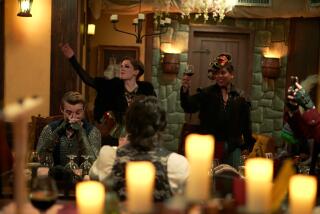Barflies who are all too ordinary
- Share via
WARNING: A bar may be hazardous to a novel. Too often, that setting comes burdened with a cache of literary cliches ready to trip all but the craftiest of writers: a cast of colorful, idiosyncratic characters; a drink slinger dispensing lethal cocktails of booze and hard-knock wisdom; a jukebox stocked with highly meaningful tunes; and a steady drip of truisms about life, love, death.
Although Rebecca Barry chose to articulate her debut, “Later, at the Bar,” a novel in stories, around that fraught backdrop, she wisely left off most of its usual appendages. Her tone is flatly but often tenderly observational, the barkeep simply hovers on the periphery of the action, the patrons mostly spare us the tears, if not the beers. Even better, Barry also refrains from endowing her characters -- especially the male ones -- with the kind of show-offy destructive instinct and Charles Bukowski--inspired misanthropy that are the bar bard’s default setting.
Standing out from the crowd at Lucy’s Tavern, a homey watering hole in a small, working-class town in upstate New York, are reckless twins Cyrus and Harlin Wilder, who are not averse to brawls and afternoon intoxication. The pair, along with their tough-but-not-jaded exes Grace and Janet, may be their own worst enemies, but they are brought down by a surfeit of dreams rather than a lack of them. “It’s not disappointment that gets me with you,” Harlin remembers his mother telling his father, “it’s the hope.” The shadow of those aspirations always lurks behind Barry’s spare, unadorned prose.
Largely free of cheap pathos, her characters fall in, out and back in love again, lust after each other more or less openly, and sometimes make do with a supportive shoulder and an open ear. Lucy’s Tavern is such a deeply familiar part of its regulars’ daily routine that they find it hard to adjust to their lives away from it; at one point Linda Hartley (an advice columnist who, of course, can’t fix her own problems) reflects on “how hard it was for them to fit into each other’s worlds outside the bar” when musing about her ex-boyfriend Austin.
Alas, stories can’t sustain momentum if they’re distinguished not by what they are but by what they aren’t. Barry’s steadfast refusal to ramp up -- some may wistfully say indulge in -- the drama helps her keep things minimally elegant in a detached, New Yorker-ish way, but it also means that quirks are not allowed to blossom into actual personalities; broad-stroke traits, as endearing as they are, do not deepen into more dangerous fractures. This is illustrated by the fact that two intriguing characters are barely sketched out, as if their outlaw sexuality ran the risk of pushing the stories into uncouth trendiness. It’s hard not to want to know more about the tavern’s founder and namesake, Lucy Beech (“Like many women in that town, and perhaps the world over, Lucy fell in love with a handsome woman after years of loving men”), and the current bartender, Rita Johnson, who “could do most things a man could do, including bed women, which she did spectacularly well.”
The problem is compounded by the fact that Barry does not make the most of her chosen structure, that of linked stories. The 10 tales follow an unimaginatively linear path, and quickly a feeling of dull repetition settles in. Meanwhile, the successive points of view don’t vary enough to provide much-needed changes in perspective. (Compare this approach with that of Tim Winton in his masterful 2005 collection “The Turning,” in which an aching group portrait emerged from the way he exposed distinctive aspects of his protagonists’ lives by playing with chronology and constant shifts in camera angle, so to speak.)
In the end, it’s Barry’s kindness to her characters, her refusal to get her hands dirty, that undermines her book. For although humility is refreshingly appealing in our era of gimmicky lit tactics, it can also backfire. “Later, at the Bar” doesn’t transcend its voluntarily intimate scale. Just as Lucy’s Tavern and the neighboring Hank’s Diner can’t fill all the longings in their patrons’ lives, Barry’s stories are undone by their modesty and leave the reader pining for a less-polite, less respectful book -- one unafraid to confront despair, unfairness and yes, vulgarity.
The pages drift by easily but also unremarkably, and by the end you may find yourself echoing Peggy Lee’s jukebox classic as you wonder, is that all there is?
Elisabeth Vincentelli is arts and entertainment editor at Time Out New York.
More to Read
Sign up for our Book Club newsletter
Get the latest news, events and more from the Los Angeles Times Book Club, and help us get L.A. reading and talking.
You may occasionally receive promotional content from the Los Angeles Times.










